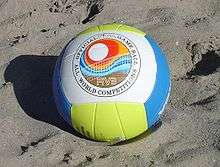Mikasa Sports
 | |
| K.K. | |
| Industry | Sports Equipment |
| Predecessor | Masuda Rubber Industries, Myojyo Rubber Industrial Co. |
| Founded | May, 1917 |
| Headquarters | Hiroshima, Japan |
Key people | Taketoshi Saeki (President) |
| Products | Sports balls |
| Revenue | ¥6.5 billion (2010) [1] |
| Total assets | ¥120 million (2009) |
Number of employees | 137 (2010) [1] |
| Website | www.mikasasports.co.jp |
Mikasa Corporation (株式会社 ミカサ Kabushiki Kaisha Mikasa) is a sports equipment company with its corporate headquarters in Nishi-ku, Hiroshima, Japan.[2][3]
Their football, basketball, volleyball, waterpolo and handball are often used for official matches, games and competitions. Notably, Mikasa volleyballs are the official balls for all Fédération Internationale de Volleyball worldwide competitions, and numerous domestic leagues outside of North America.[4]
Mikasa volleyballs are the official ball for the 2012 London Olympics. Presently clubs, regions, high schools, colleges, and tournaments throughout the U.S. use Mikasa volleyballs.
Products
Mikasa makes many different types of balls, including goods for basketball, beach and indoor volleyball, football, rugby union, waterpolo, korfball, American football and rugby football (the last two, only in the United States).[5]
Sponsorships
Mikasa has been official ball provider of the following leagues and associations, as well as it has exclusive agreements with some prominent athletes:
Volleyball
International Volleyball Confederations
 Volleyball Schools Cup - Youth, Junior, Intermediate, Senior and Opens
Volleyball Schools Cup - Youth, Junior, Intermediate, Senior and Opens Confederação Brasileira de Voleibol
Confederação Brasileira de Voleibol Men's European Volleyball Championship, Women's European Volleyball Championship (1970, 1979, 1981, 1983)
Men's European Volleyball Championship, Women's European Volleyball Championship (1970, 1979, 1981, 1983) Fédération Internationale de Volleyball
Fédération Internationale de Volleyball FIVB Volleyball Men's World Championship, FIVB Volleyball Women's World Championship (1978,1982,1998)
FIVB Volleyball Men's World Championship, FIVB Volleyball Women's World Championship (1978,1982,1998) Volleyball World Grand Champions Cup (1997)
Volleyball World Grand Champions Cup (1997) FIVB Volleyball Men's World Cup, FIVB Volleyball Women's World Cup (1999)
FIVB Volleyball Men's World Cup, FIVB Volleyball Women's World Cup (1999) Athens Olympic Games (2004)
Athens Olympic Games (2004) Beijing Olympic Games (2008)
Beijing Olympic Games (2008) Misty May-Treanor
Misty May-Treanor Reid Priddy
Reid Priddy University Athletic Association of the Philippines
University Athletic Association of the Philippines Shakey's V-League
Shakey's V-League Philippine Super Liga
Philippine Super Liga University of Rizal System Seniors and Juniors teams
University of Rizal System Seniors and Juniors teams
National teams
Waterpolo
 Ligue Européenne de Natation
Ligue Européenne de Natation Fédération Internationale de Natation (men and women)
Fédération Internationale de Natation (men and women) Beijing Olympic Games (2008)
Beijing Olympic Games (2008) London Olympic Games (2012)
London Olympic Games (2012) CIF Southern Section
CIF Southern Section Tony Azevedo
Tony Azevedo National men and women teams
National men and women teams NCAA
NCAA
Multi sports
 Universiade - volleyball and water polo (since 1979)
Universiade - volleyball and water polo (since 1979)- Asian Games - volleyball, beach volleyball, basketball, football, handball, and water polo (1982, 1994, 1998)
Manufacturing conditions
Mikasa manufactures products in Thailand and has been accused of workplace brutality and human rights violations in some factories. The International Trade Union Confederation, published a report alleging "systematic anti-union campaigns" by Mikasa.[6] The report detailed various allegations:
| “ | Supervisors intensively monitored and penalised union leaders through discriminatory transfers and disciplinary procedures for trumped up infractions. Union committee members were prevented from working overtime, compelled to take unpaid leave, separated from their fellow workers, and publicly humiliated by senior managers, in one case destroying their work then ordering them to fix it. When three union committee members publicly protested against the factory’s actions against workers, the management sued them in court for defamation.
When a union committee member who was pregnant miscarried during her day shift at the factory, she requested the factory to send her to a local hospital. Management refused, and instead sent her to the medical room at the factory, where she was forced to wait until the evening when a friend from another factory came and took her to hospital for treatment.[6] |
” |
Through such practices, the ITUC argued, Mikasa succeeded in either firing or forcing the resignation of the entire union committee (except the union president), essentially destroying the right of its workers to organize.
A separate report, by the Thai Labor Campaign alleged that new Mikasa factory workers received only 173 baht per day ($4.36 per day) in 2006.[7]
Gallery
- A Mikasa basketball.
 A beach volleyball resting on a sand court.
A beach volleyball resting on a sand court. A blue, yellow, and white indoor volleyball by the company.
A blue, yellow, and white indoor volleyball by the company.- A men's water polo game ball sits on a pool deck.
See also
References
- Notes
- 1 2 Company profile
- ↑ "Company Profile." Mikasa Sports. Retrieved on September 9, 2012. "11-2, 3-chome, Kusunoki-cho, Nishi-ku Hiroshima 733-0002, Japan"
- ↑ "会社概要." Mikasa Sports. Retrieved on September 9, 2013. "所在地 広島市西区楠木町3丁目11番2号"
- ↑ http://www.mikasasports.com/
- ↑ Mikasa Sports USA - Products manufactured
- 1 2 2007 Annual Survey of violations of trade union rights - Thailand: Violations in 2006, International Trade Union Confederation, 2007, survey07.ituc-csi.org
- ↑ The Life of Football Factory Workers in Thailand, Junya Lek Yimprasert, Thai Labor Campaign, June 30, 2006, PDF from CleanClothes
- Bibliography
- Michigan High School Athletic Association Bulletin, Volume 70, Michigan High School Athletic Association, 1993, University of Michigan, p. 464.
- Gay and lesbian tourism: the essential guide for marketing, Jeff Guaracino, p. 146.
- Sports sponsor factbook, Team Marketing Report, Inc., 1999, p. 623.
- Japanese multinationals, facts & figures, Tōyō Keizai Shinpōsha, 2007, p. 268.
- American Commercial Inc. d/b/a Mikasa and Mikasa Licensing, Inc. v. Sports and Leisure International d/b/a Mikasa Sports, Civil Action No. 96–713LHM (U.S.D.C. C.D. Cal.).
External links
| Wikimedia Commons has media related to Mikasa Sports. |
- Mikasa Japan (English)
- Mikasa USA
- Mikasa Europe